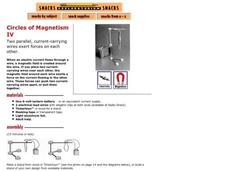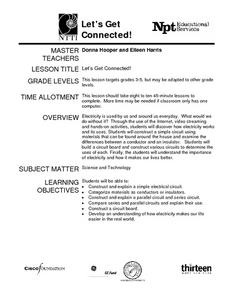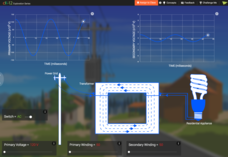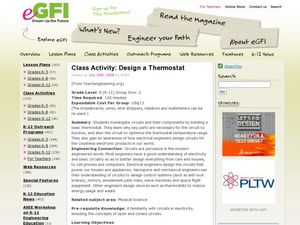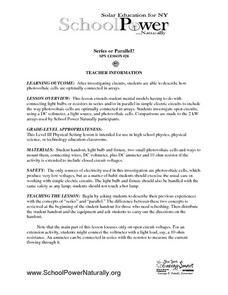Colorado State University
How Can You Demonstrate the Different Efficiencies of Different Light Bulbs?
Need a bright idea for an engaging lab? Watch your class light up as they explore the difference in efficiency between incandescent and LED bulbs! The resource makes use of simple materials and encourages learners to infer what's...
PHET
Capacitor Lab
The first capacitor was a Leyden jar, invented in 1745. Physics scholars explore capacitors in an engaging simulation. They may view one or set up circuits which contain two to three either in series or parallel. Other views include...
Science Friday
Make a Speaker
Make science come in loud and clear. Pupils learn about how a speaker works by building one. The scholars first learn about electromagnetic fields by building an electromagnet. Using that knowledge, they build a crude speaker using a...
Curated OER
Physics: Electricity and Magnetism
Pupils draw series and parallel electrical circuits. In this electromagnet lesson, students describe how current changes depend on circuit components. Pupils use an OHT of a series and parallel circuit to predict the path of...
Teach Engineering
Can You Resist This?
Some things are hard to resist. Small collaborative groups build circuits and calculate the voltage using Ohm's Law. Budding engineers explore the connection between the voltage across different resistors and linear...
Curated OER
Energy
Wow! Colorful and simple, these 160 slides introduce the various forms of energy, along with a relevant image. Some of the images are animations, which help beginning physical scientists to visualize the flow of electrons or energy! This...
Institute of Electrical and Electronics Engineers
Insulators and Conductors
In a classic activity, emerging electricians test various objects for electrical conductivity in a circuit. Each group constructs a simple circuit by following a diagram. Predictions are made and objects are inserted into the circuit,...
Teach Engineering
Circuits and Magnetic Fields
Have your class use compasses to try to find the magnetic field around an electric current. Groups use the same technique to visualize magnetic fields as they did in the second activity in the series, but this time, the field is...
CK-12 Foundation
Flashlight
In a simple circuit, does electricity start instantly? A simulation encourages thinking about the flow of electrons at a microscopic level. Pupils control the voltage, resistance, and switch in order to observe the change in both ideal...
Purdue University
Light – Just Right!
What does it mean to be resistant to electricity? Scholars answer the question in a six-part STEM instructional activity on electricity. They begin by assessing the conductivity of several different materials and progress to designing...
Exploratorium
Circles of Magnetism IV
Hang a strip of foil on a stand and form a loop out of it. Then attach the clips of a battery-operated circuit to the loop to see its sides repel each other. This simple demonstration is applicable and easy to add to your lecture on...
Curated OER
Let's Get Connected!
A great lesson introduces your youngsters to electricity. They use internet links, streaming video, and engage in hands-on activities to understand what electricity is and how it works. They build a circuit board, and construct a variety...
CK-12 Foundation
AC Transformer
High voltage power lines deliver electricity to homes, but each home requires low voltage. How does the energy get converted so it can be used safely? Pupils explore alternating current and transformers through a simulation. They control...
CK-12 Foundation
Flashing Neon Light
How does a neon light work and does it actually contain the gas neon? An enlightening simulation encourages pupils to play with circuits and neon lights. They control the capacitance, resistance, and color of the bulb, and the simulation...
eGFI
Design a Thermostat
Using a thermostat is an eco-friendly way to control indoor climate. Young engineers practice building electric circuits by designing and constructing a thermostat. Plenty of background information, a vocabulary list, links to the...
Curated OER
High Reliability Circuits
In this physics circuits worksheet, students calculate and write short answers to 9 questions about high reliability circuits. They solve and draw schematic diagrams.
Curated OER
Printed Circuit Board Layout and Manufacture
In this electrical worksheet, students answer a series of 7 open-ended questions. Students explain the use of terms used in circuit board layout and manufacturing in order to answer the questions. This worksheet is printable and...
Curated OER
Electric Shock
In this electrical worksheet, students answer a series of 17 questions about electrical shock and electrical safety. This worksheet is printable and the answers are available on-line.
Curated OER
Electricity: Series and Parallel Circuits
Fourth graders explore electricity and electrical circuits. They explore series and parallel circuits using Christmas lights. Students pull lights out of each strand of lights. They observe the results when the light bulb is pulled out....
Curated OER
Changing Circuits
Students study how bulbs work by studying a series circuit and its components. In this electricity study lesson, students complete a SmartBoard online activity to study a bulb light in an electrical circuit. Students discuss what would...
Curated OER
Series or Parallel?
Physics classes that are studying electricity connect photovoltaic cells into both series and parallel circuits. Inquiry and critical thinking come into play as learners try to determine which circuit is more productive. They associate...
Curated OER
Flick the Switch
After reading a short paragraph on how electrical switches work, learners look at four examples of electrical circuits, and circle the ones which will allow a lightbulb to be lit. This would be a good precursor to having your charges...
Curated OER
Interview With An Electric Light Bulb
For this electric light bulb worksheet, students answer short answer questions about an electric light bulb by pretending they are answering interview questions and they are the light bulb. Students complete 7 questions total.
Curated OER
WHAT MAKES A LIGHT BULB LIGHT?
Students are able to use inquiry to answer the essential questions. They are able to predict and test configurations of a battery, bulb, and wire that make the complete circuit. Students craft a group and individual theory of a...










